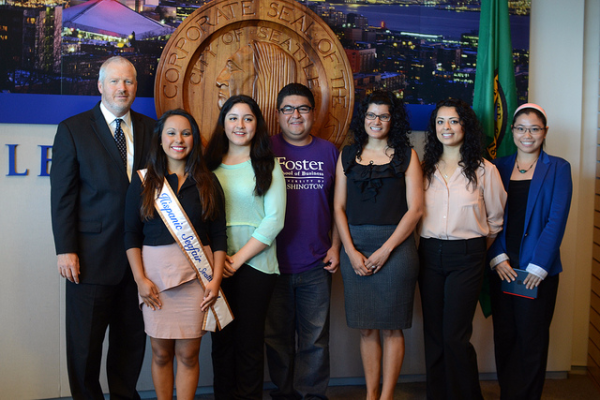
The mayor of Seattle poses with young people eligible for work and education authorizations through the federal Deferred Action for Childhood Arrival program.
Parashat Ki Tavo
Deuteronomy 26:1 – 29:8
Our Torah portion expands upon the choice facing the Jewish people as they enter the Promised Land, a land of opportunity and challenge. There is so much good promised to the people, but there is also a great risk. Will we be loyal to our Creator and grateful for all our divinely bestowed gifts? Or will we ignore those gifts and forsake our God? As in his previous remarks, Moses couches the choice in terms of blessings and curses.
Moses warns: “If it happens that you will not listen to the voice of the Eternal, your Almighty God, to care for and keep all God’s commandments that I command you today, then all these curses will come upon you and overtake you (v’hisigukha).” (Deut. 28:15) The admonition is clear. If you choose not to keep the Torah, then evil forces and tragedies will pursue you and catch up with you no matter how fast you try to flee from them. “They will overtake you.” This word is used in earlier places in the Torah. For instance, Pharaoh began pursuing the Israelites after they fled from Egypt. “The enemy said, ‘I will pursue them and overtake them…” (Ex. 15:9) And cities of refuge are set up lest the avenging relative of a family member catch up with the accidental killer. (Deut. 19:6)
So it is surprising to find this same term used by Moses to describe the opposite situation. He promises: “All these blessings will come upon you and overtake you (v’hisigukha) when you listen to the voice of the Eternal, your Almighty God.” (Deut. 28:2) In what sense can we imagine the blessings having to pursue and catch up with a person? Why would the person be running away from blessings?
But this is exactly the point, says Rabbi Moshe Hayyim Efraim of Sudilkov, the grandson of the founder of Hasidism, the Baal Shem Tov. He explains: “We must try to understand this, for it has no apparent explanation. Shouldn’t it say the opposite: ‘And he will catch up with the blessings,’ and not that the blessings will catch up with him? But the matter is just as was spoken by King David, “Surely only goodness and love will pursue me all the days of my life.” (Ps. 23:6) That is to say that sometimes a person may flee from the good because of his shortsightedness, not knowing whether it is really good. Thus King David exalted, “’Surely only goodness and love will pursue me’ and overtake me – even though I do not know that I should pursue them.” (Degel Mahaneh Efrayyim, Ki Tavo)
We are not always certain about what things in life are good for us and what may be injurious. And sometimes we are quite certain that we know what is good for us and what is not, but we are wrong. Previously Moses has tried to persuade us that the very commitment to following the Torah is itself “the blessing.” (Deut. 11:27) But now Moses is saying something else. Our commitment to following the Torah is meant to produce a “startling” effect. We will be “overtaken” by blessings that we never recognized to be blessings! We will be startled to learn that our negative assessments of parts of humanity or parts of the world were wrong. It is not that we will automatically become wise and judicious. We may still be fearful and have many negative presuppositions about people and situations. We will still not immediately recognize that some of those people or experiences are actually blessings for us. But we will be opened up enough to feel the emotion of surprise and wonder that comes from being overwhelmed by an unforeseen good.
The function of a commitment to following the Torah should not be, as seems too often to occur, to close down our minds and hearts, to increase our fears and prejudices and to strengthen them. The function should be to strengthen us to experience the exhilaration – or even just the bewildered acknowledgment – that comes when our prejudices and hesitations are overtaken by a change of perspective. The function of the Torah is to turn us into Dreamers, who, like Jacob, could say, “Indeed, God is in this very place, and I just did not know!” (Gen. 28:16) May all Dreamers be protected and safely guarded.
Shabbat Shalom,
Rabbi David Greenstein
![]()
Subscribe to Rabbi Greenstein’s weekly d’var Torah
- Toby Stein: In Memoriam - Thu, Feb 8, 2024
- Faithfulness and Hope: Parashat Sh’lach - Thu, Jun 23, 2022
- Past Their Prime: Parashat B’ha`a lot’kha - Thu, Jun 16, 2022
